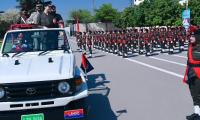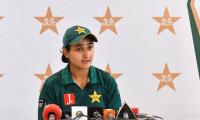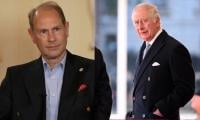LAHORE: The two-day ‘Asma Jahangir Conference 2019 – Roadmap for Human Rights’ concluded here on Sunday.
At least 120 international and national intellectuals, jurists, politicians, human rights activists, media persons and notables delivered their speeches at 20 sessions of the moot. Panellists from England, America, Sri Lanka, Bangladesh, Ireland, Sweden and Afghanistan took part in discussions and thousands of participants, especially law students, attended these sessions. They all resolved to carry forward the legacy of Asma Jahangir, who fought relentlessly against dictatorial forces and always sought due process of law, equality for women and protection of minorities in the country.
On the concluding day of the conference, former foreign minister Khurshid Mahmood Kasuri said that no one could doubt the patriotism of any ethnic community of Pakistan, and there was need to strengthen democracy in the country by establishing it within political parties in letter and spirit. He also suggested that moderate people should not keep silent on the national issues. He was sharing his thoughts with the panellists in a discussion on ‘State discourse and nation building’ session, moderated by media person Arif Nizami, here on Sunday. Other panellists included Lt-Gen (retd) Talat Masood, former president Supreme Court Bar Association Ali Ahmed Kurd, PPP MNA Chaudhry Manzoor and Supreme Court lawyer Syed Ali Zafar.
Kasuri told the audience the dream of Quaid’s Pakistan was presented with distortion and Quaid’s speech was removed from archives. The Quaid gave the slogan of ‘Unity, Faith and Discipline’, but his slogan was not imparted to the children of the nation the way it should have been. He said those nations who distort their history face the consequences, and we are experiencing the same.
However, he added, now Pakistan, after 40 years, was coming out of it and getting understanding of Quaid’s dream of ‘Unity, Faith and Discipline’, while Premier Narendra Modi had been pushing Gandhi’s India to destruction by depriving the minorities of their rights. He said Modi had deprived Kahsmiris of their identity by revoking Article 370, but he would not succeed in it ever.
Further, he added, Modi was imposing Hindi as national language in south India and it would have adverse consequences. Pakistan had made that mistake when it imposed Urdu as national language in Bengal, and it resulted in disintegration of Pakistan. He quoted his father telling him that people in Asam and Bengal used to speak Urdu till it was not imposed on them by the state. He said no language could be popularised by imposing it on anyone. He said the narrative of one ethnic community’s superiority would not prove successful.
Kasuri believed that all citizen of Pakistan and all ethnic communities are equal in Pakistan and have equal rights. He said nations get strengthened with the ethnic communities living there, and, in Pakistan, all are Pakistanis. “One could not look at any ethnic community with doubt. Sindhi, Baloch, Pathan, Punjab or any other community has equal rights in Pakistan,” he added.
Lt-Gen (R) Talat Masood said the army role had always been crucial in the country since the creation of Pakistan due to its national security, duties performed for settling and protecting the refugees, and the Kashmir struggle starting in 1948. He said to understand this role, one would have to go through the historic facts. The Englishmen gave importance to Punjab and Khyber-Pakhtunkhwa regions in hiring to army and civil bureaucracy due to the loyalties of people of these areas. Unfortunately, after Quaid-e-Azam Muhammad Ali Jinnah and Liaquat Ali Khan, there was no strong political leadership in Pakistan, while in India Congress was a strong political and democratic setup.
He said now question arises how democracy could be strengthened in Pakistan. He said in Pakistan, democracy always remained weak, institutions were weak and the army always remained influential. He admitted that in Pakistan, the role of army had been more than the normal one, needed in any democracy. However, he said the political parties should also bring democracy in their ranks and give due positions to political workers, who worked and sacrificed for the party, instead of filling in the important positions on inheritance basis. He said a political government should run on performance basis instead of patronage. He suggested that Pakistan Tehreek-e-Insaf (PTI) government should talk to the opposition parties, and make their reliance on the public and their votes instead of any institution. He stressed the need for making the parliament strong, and strengthening the public account committees of the parliament.
He said Pakistan could get respect in the world with a strong democracy. Without a strong democracy, the democratic institutions would not strengthen, and without strengthening public, democracy would not strengthen, Talat Masood added.
As the closing note, Talat Masood stressed the need for strengthening democracy, politics, political parties, creating balance among the government institutions to work in harmony and in accordance with the constitution. He said Pakistan was facing external threats from Afghanistan, it had been engaged by India over the Kashmir issue. Therefore, in such a scenario, it needed to strengthen internally by resolving all internal issues. He said Pakistan needs to be strong economically, diplomatically and socially to tackle the external threats.
Former president Supreme Court Bar Association Ali Ahmed Kurd said that the lawyer movement was one of the finest and the best in the recent history of Pakistan. Now activists of the movement tell their stories to their children and the younger generation. He said that one unseen movement is continuing, and it was everyone’s duty to become part of it. He said that this unseen movement would become a major political movement in future and political activists should join their voices for the movement. He said that no one dares ask ‘them’ about the state discourse in nation-building. He said where the thoughts of those while throwing out an elected prime minister on an Iqama in Panama Papers case. Now, he added, when a little time has left their thoughts have changed.
He said they ask for the patriotism certificate from the Balochistan people, while every three miles one picket is set up for their security. “I asked them to give identity to the Balochistan people and then they will not need any security, and they will not need pickets there,” he said.
On the closing note, Kurd said that everyone owns Pakistan and every ethnic community like Sindhi, Baloch, Pakhtun, Punjabi and others are part of it. He said by dividing them, Pakistan had already suffered a lot, and the practice should come to an end now.
PPP MNA Chaudhry Manzoor said that his party had always sacrificed for democracy in Pakistan and Chairperson Benazir Bhutto was martyred for it. The PPP always promoted democracy within the party as well. However, ‘they’ called the late Amin Fahim and others to come forward to take over the party and they will make it their PPP, but it never happened. He said freedom of every institution including the media was being curbed, which would adversely affect democracy in Pakistan.
On the concluding note, Chaudhry Manzoor, responding to a narrative and observation of Lt-Gen (retd) Talat Masood, commented that political parties were functioning despite all odds. He questioned that why couldn’t responsible persons in the most important institution, who run other institutions, select anyone to head the institution and had to continue with the old one many a time.
Supreme Court lawyer Syed Ali Zafar said Pakistanis were misinformed and baffled through education about the Two-Nation Theory of creation of Pakistan. He said the ‘Two-Nation Theory’ was for creation of Pakistan, but after creation of the country, we all are one nation and this needs to be conveyed to the younger generations. He said any democracy in which the rule of law did not exist is not a democracy. He said the judiciary ensures the rule of law in the country, but that rule of law should also be applicable to the judiciary as an institution. Otherwise, the judiciary would start fixing medical colleges’ fee, and imposing taxes.
Ali Zafar said that silence of moderate plays major role in spreading terrorism. He believed that moderate people should not keep their voice shut, and they should keep rising on every issue which is going against society. He said harmony and tolerance were required to promote democracy in Pakistan. He said it was unfortunate that an elected democratic government had just completed one year and there are protests and sits-in against it for sending it packing.
Giving his closing remarks, Arif Nizami said that all institutions and civilian control will get strengthened when the media, and the other institutions, will become free. He said all institutions and the media had offered sacrifices in the past and they would again offer sacrifices when the time comes. He said democratic institutions were also redefining themselves.
Speaking at another session, former premier Yusuf Raza Gilani said: “Today, fundamental values are under assault. Media censorship is stifling any voice critical of the government, and the opposition is being deprived of the right to peacefully protests.
Gilani said: “I am very concerned that the incumbent government seeks to bring us back to the era of political instability where the law-enforcement and accountability mechanisms are used to hound the opponents. We must resist this.”
Gilani claimed that during his tenure, there were no political prisoners and there were no witch-hunting against political opponents. “It is unfortunate that the incumbent government has abandoned the principles of parliamentary democracy," he regretted.
Other speakers at the sessions were PML-N spokesperson Marriyum Aurangzeb and PTI MNA Munaza Hassan, who paid tribute to Asma Jahangir and appreciated her commitment to human rights with a resolve to uphold the rule of law and struggle for women’s rights.
Munaza Hassan spoke of women’s right to inheritance and Marriyum Aurangzeb lamented a selective accountability going on against her party.
Daughter of Asma Jahangir and journalist Munizae Jahangir, who conducted the session, said: “It is a rare moment when all political parties are seen on the same platform.” She said that politicians conveniently forget to protect fundamental rights and right to expression when in they assume power. She said: “We are convinced that without freedom of the media, the rule of law and guarantees of security to human rights defenders, neither democracy nor justice, is possible. The main challenge to development of Pakistan and the rights of its citizens is a national security state. Until the national security is subservient, no other initiative in economy, health, education and rule of law can find success, she added.
The day began with a recording of Asma Jahangir receiving the Right Livelihood Award, where she spoke of growing expectations of citizens as far as what the governments should deliver. And governments falling ever further behind, internationally this gap of creative impulses of society on one side and governments dragging their feet on the other, has been the key engine of human rights challenges. Despite threats to her life, she spoke of never leaving Pakistan as it is a place where she has received most love and affection.
Lahoris, meanwhile, reached the venue in large numbers on Sunday morning to see the works of young miniature artist Fatima Salman, who did a series of paintings, inspired by conflicts in South Asia.
Poetess Neelum Bashir recited her poetry to an enthralled audience while Salima Hashmi conducted the discussion.
As a continuation of the discussion on ‘Art inspires politics’, Munizae Jahangir conducted a panel discussion on ‘How women can build bridges for peace in South Asia’.
Former foreign minister Hina Rabbani Khar, Afghan politician Fawzia Koofi, human rights lawyer from Sri Lanka Bhavani Fonseka, Swedish Ambassador Ingrid Johansson and former Afghan ambassador to Pakistan Omar Zakhilwal opined that peace in South Asia was a prerequisite to securing women’s fundamental rights and the resources should be directed towards socio-economic areas rather than the military.
Human Rights Ambassador of the Kingdom of the Netherlands, H. E. Dr Bahia Tahzib-Lie, Award-winning novelist Mohammad Hanif, Christian Caryl of the Washington Post, Wusat Ullah Khan, Ms Aisha Sarwari and Iqbal Khattak participated in the discussion on the role of social media.
Dr Bahia talked about the centrality of human rights in a thriving democratic society, and also the role of her government in supporting human rights initiatives all-over the world, including Pakistan. Aisha Sarwari talked about how women are systematically excluded from law-making process and, therefore, law-making concerning social media. She said it is essential for the social and economic development of all countries for women to be able to use the media as disruptive technology and end permission culture.
Caryl spoke on the experience of organised troll armies attacking the Washington Post during their investigation into the murder of Jamal Khashoggi. He said there is a strange right-wing alliance between trolls based in some ME countries, Israel and the USA. Online privacy but also the challenge of abusive and anonymous accounts is a complex legal challenge. In the US, several laws have been drafted, but with hindrance from the software giants, none have been made into laws.
Wusat Ullah Khan mentioned that the social media gives space to freedom, but also makes people extremely vulnerable. He said freedom of speech is part of a bouquet – you cannot talk about freedom of speech without talking about right to life and education and freedom of religion.
Iqbal Khattak, country representative of Reporters without Borders (RSF), spoke about the need for digital safety training and how one should protect oneself by disengaging with trolls. He particularly highlighted threats, accusations of blasphemy as threats that should be taken very seriously. He strongly encouraged use of PICA laws for individuals to seek online protection. He also highlighted Pakistan’s considerable investment in controlling social media spaces and vigilance on part of civil society. The Government of Pakistan should take social media as fundamental right.
The session on transgender rights was conducted by human rights activist Ali Dayan Hassan and affirmed that the protections reaffirmed by law in the Transgender Protection Act 2018 be enforced in letter and spirit.
Bhavani Fonseka spoke of similarities with South Asia of authoritative regimes, marginalising communities by constitutional and political means. And the cycles of violence that result from these actions. She urged the development of cross-cutting communities, as professional circles raise the issues of marginalised communities.
Jalila Haider identified the Hazara community as an example – they are not a security or a religious challenge and yet they are still victimised. The issues, she said, is not the identity of the community but the misuse of religion and politics.
Zimran Samuel, a human rights practitioner from the UK, said the blasphemy law exists in several countries, but has been misused in Pakistan without parallel in other countries. He also spoke of the increasing problem of forced conversions, sometimes instigated by well-known persons.
Zana Muhammad and Minister Maria Radinger spoke of Sweden where majority and minority, religious leaders have worked together and created spaces where young people of different communities work through art, social media and conversations. To create a common diverse Swedish identity in which all can participate and are eager to bring their conversations and experiences to other countries in the world.
At the ‘Economic and Social Inequality Panel’, economist Dr Hafiz Pasha and Shahid Kardar and Qaiser Bengali resolved that the regressive tax system should be revised.
On fighting the culture of shame and silence, woman rights activist Uzma Noorani, British professor of human rights Ms Siobhan Mullally, provincial Ombudsperson Khyber-Pakhtunkhwa Rukshanda Naz, Pakistan People’s Party leader Nafisa Shah, former chairperson of the Punjab Commission on the Status of Women Fouzia Viqar said that there should be universality of rights, for all excluded communities including women and marginalised remote communities.
The conference urged that there should be dedicated courts to deal with violence against women. Special budgetary allocations should be made to support women. The Government of Pakistan is signatory to the international conventions against violence of women.
On the topic, ‘FATA – post-merger’, which was moderated by journalist Saleem Safi, Farhatullah Babar, senator Pakistan People’s Party, Ms Samina Afridi, KP finance minister Taimoor Jhagra, Mohsin Dawar, parliamentarian and Syed Amjad Shah recommended that the funds for FATA merger, which is the divisible of 3%, should be given to it. The funds almost amounted to 100 plus billions of rupees, which should be given to the tribal areas regularly and quickly. The policing duty should be assigned to the police. Ordinance of Action-in-aid of Civil Power Regulations 2011 should be taken back and instead of promulgating it in the future, political activities should be revived in the region. The human rights situation in the tribal areas should be monitored by a committee, made of all stakeholders and all political parties.
On selective accountability, legislative and judicial failure, Qamar Zaman Kaira, Pakistan People’s Party President Punjab, Ms Shaista Malik, Member of National Assembly, Irfan Qadir, former Attorney General for Pakistan, Senator Waleed Iqbal and former Supreme Court Bar Association president Yasin Azad highlighted that the process was lopsided, the exclusion of some segments from the process was against the basic concept of accountability. It was pointed out that historically and currently, the process was being used as a means to achieve political ends. Irfan Qadir said that accountability had certain conditions, which must be met.
It was recommended that legislation must be carried out by rising above politics and by engaging with experts and pointed out defective legislations like the harassment at workplace. Kaira stated that the political process was defective as a whole and society must change their political mindset for change to come. He pointed out the preferences of people while choosing their representatives would only yield the kind of representatives that we currently possess and thus a change in societal mindset was required.
Waleed Iqbal said a draft was ready with the law minister which dealt with the required changes to the NAB law (including bail). He pointed out that both the NAB law and 62-1(f) were still existing due to the fact that the PML-N had refused to support efforts to change these laws. Various excesses of the institutions and the judiciary were pointed out and it was unanimously agreed that all institutions should work within their domains.
It was further pointed out by Mr Iqbal that since all civilian leaders originated in the state nursery, their mindset was reflective of the same. It was concluded that accountability should be across-the-board, deficiencies in the law should be removed and its implementation should be even-handed and efficient.
On ‘Silencing civil society’, Ms Fareeda Shahid moderated the session of Knut Ostby, United Nations Resident and Humanitarian Coordinator for Pakistan. Ms Zohra Yusuf, human rights activist and council member of HRCP, Mohammad Tehsin, convener of Pakistan Civil Society National Forum, law expert Asad Jamal said registered civil society organisations should be allowed to function, 2013 policy of banning CSOs should be challenged. Mass communication needed to change narratives.
Khawar Manika's counsel continued his arguments on Wednesday in a petition filed by Imran Khan and Bushra Bibi
IHC reserved judgment on the petition against registration of cases against former interior minister Sheikh Rashid on...
Saudi woman who was reportedly kidnapped from Islamabad’s residential Sector F-8 in mysterious circumstances, has...
Pakistan Navy warship rescued 8 Iranian fishermen after their boat caught fire in the open sea
SC dismissed appeal against SHC order that turned down application of partner seeking extension of time to furnish...
Executive board of International Monetary Fund will meet on April 29 to discuss the approval of $1.1 billion funding...







